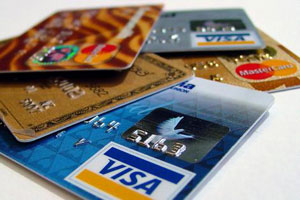 Adam Levitin wrote an informative post on Credit Slips a couple of weeks ago; I missed it but it looks like no one in my RSS reader has mentioned it, so here goes. One provision of last year’s credit card legislation limited up-front fees to 25% of the line of credit being offered. First Premier Bank currently offers a card with a $250 credit line, $124 in up-front one-time fees, a $48 annual fee, and a $7 monthly fee. Oh, and a 9.9% APR on purchases. That adds up to $179 that gets billed immediately, and a total of $256 over the first year–more than the credit line. Because this card will become illegal in February, they are test-marketing a new card that has a $300 credit line, $75 in up-frontfees (to conform with the law; there could be a monthly fee in addition), and a 79.9% APR.
Adam Levitin wrote an informative post on Credit Slips a couple of weeks ago; I missed it but it looks like no one in my RSS reader has mentioned it, so here goes. One provision of last year’s credit card legislation limited up-front fees to 25% of the line of credit being offered. First Premier Bank currently offers a card with a $250 credit line, $124 in up-front one-time fees, a $48 annual fee, and a $7 monthly fee. Oh, and a 9.9% APR on purchases. That adds up to $179 that gets billed immediately, and a total of $256 over the first year–more than the credit line. Because this card will become illegal in February, they are test-marketing a new card that has a $300 credit line, $75 in up-frontfees (to conform with the law; there could be a monthly fee in addition), and a 79.9% APR.
Levitin, using some assumptions, estimates the effective APR (including fees) of the current card at 112.3% and of the new card at 104.9%. So, a few observations:
1. The card with the 79.9% APR may actually be better for consumers. (It depends mainly on how long you use it, because you can then amortize the up-front fees; although once you’ve paid your bills for a year, presumably the goal is to establish credit to get a better card that doesn’t have $132 in ongoing fees per year.)
2. This may demonstrate the benefits of disclosure, since consumers may be deterred by the 79.9% APR. On the other hand, they may think that they are going to pay off the balance on time so the APR doesn’t matter, but some of them will miss their payments because of misfortune or accident, and then they’re stuck.
3. Most important, I think it shows the need for a Consumer Financial Protection Agency that has broad power to set new rules as the industry invents new tricks to get around the old rules. Last year’s card bill was passed in an environment of violent antipathy toward the financial services industry that has already faded and is unlikely to return soon. So two years from now, when the dust has settled and the card issuers have figured out new ways to make money through deception, I don’t have confidence that Congress will be able to respond appropriately. Last year’s bill should have been stronger in various ways. Failing that, we need the CFPA. Yes, it made it through the House, but as with health care and climate change, the Senate is likely to be tougher.
Should the new card exist? Maybe. If the pricing is transparent enough, so people understand the true cost of credit, then maybe they’ll choose it for a year to establish a credit history. Maybe with transparency the new card will simply fail in the market. But even if some people want the card, I’m still skeptical that this would show a competitive free market. What kind of assumptions do you need to justify 79.9% as the real price of the risk the issuer is taking on, especially when the issuer has pocketed $75 right off the bat (and, no doubt, is still charging late fees and the like)? The break-even default rate must be astronomical.
Appendix on price and marginal cost: The current First Premier Card has a $3.95 fee to enable Internet access to your account and a $7 fee for direct debits that you initiate over the phone or the Internet. Because, you know, mailing you bills and processing your checks is so much more cheaper than having you log in and pay using a computer. There are only two reasons I can think of for these fees, neither of them good: (1) Internet access and payment is something customers value, so we’ll charge them for it (even though it lowers the issuer’s costs), since in this segment they’ll find it hard to find another provider; (2) Internet access and payment make it more likely that customers will pay their bills on time, so we want to deter that.
Disclaimer: This page contains affiliate links. If you choose to make a purchase after clicking a link, we may receive a commission at no additional cost to you. Thank you for your support!


Leave a Reply